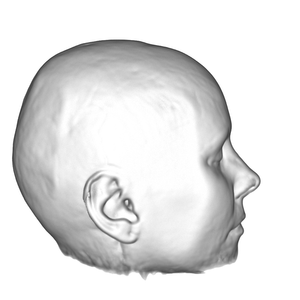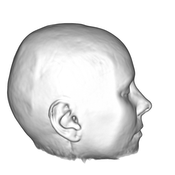Information
- Publication Type: Conference Paper
- Workgroup(s)/Project(s):
- Date: May 2007
- ISBN: 978-1-56881-337-0
- Publisher: A K Peters Ltd
- Lecturer: Muhammad Muddassir Malik
- Address: Favoritenstrasse 9-11 / E186, A-1040 Wien, Austria
- Booktitle: Proceedings of Graphics Interface 2007
- Pages: 273 – 280
- Keywords: volume visualization, ray analysis, feature peeling
Abstract
We present a novel rendering algorithm that analyses the ray profiles along the line of sight. The profiles are subdivided according to encountered peaks and valleys at so called transition points. The sensitivity of these transition points is calibrated via two thresholds. The slope threshold is based on the magnitude of a peak following a valley, while the peeling threshold measures the depth of the transition point relative to the neighboring rays. This technique separates the dataset into a number of feature layers. The user can scroll through the layers inspecting various features from the current view position. While our technique has been inspired by opacity peeling approach, we demonstrate that we can reveal detectable features even in the third and fourth layers for both CT and MRI datasets.
Additional Files and Images
Additional images and videos
Additional files
Weblinks
No further information available.
BibTeX
@inproceedings{malik-2007-FP,
title = "Feature Peeling",
author = "Muhammad Muddassir Malik and Torsten M\"{o}ller and Eduard
Gr\"{o}ller",
year = "2007",
abstract = "We present a novel rendering algorithm that analyses the ray
profiles along the line of sight. The profiles are
subdivided according to encountered peaks and valleys at so
called transition points. The sensitivity of these
transition points is calibrated via two thresholds. The
slope threshold is based on the magnitude of a peak
following a valley, while the peeling threshold measures the
depth of the transition point relative to the neighboring
rays. This technique separates the dataset into a number of
feature layers. The user can scroll through the layers
inspecting various features from the current view position.
While our technique has been inspired by opacity peeling
approach, we demonstrate that we can reveal detectable
features even in the third and fourth layers for both CT and
MRI datasets.",
month = may,
isbn = "978-1-56881-337-0",
publisher = "A K Peters Ltd",
address = "Favoritenstrasse 9-11 / E186, A-1040 Wien, Austria",
booktitle = "Proceedings of Graphics Interface 2007",
pages = "273--280",
keywords = "volume visualization, ray analysis, feature peeling",
URL = "https://www.cg.tuwien.ac.at/research/publications/2007/malik-2007-FP/",
}



